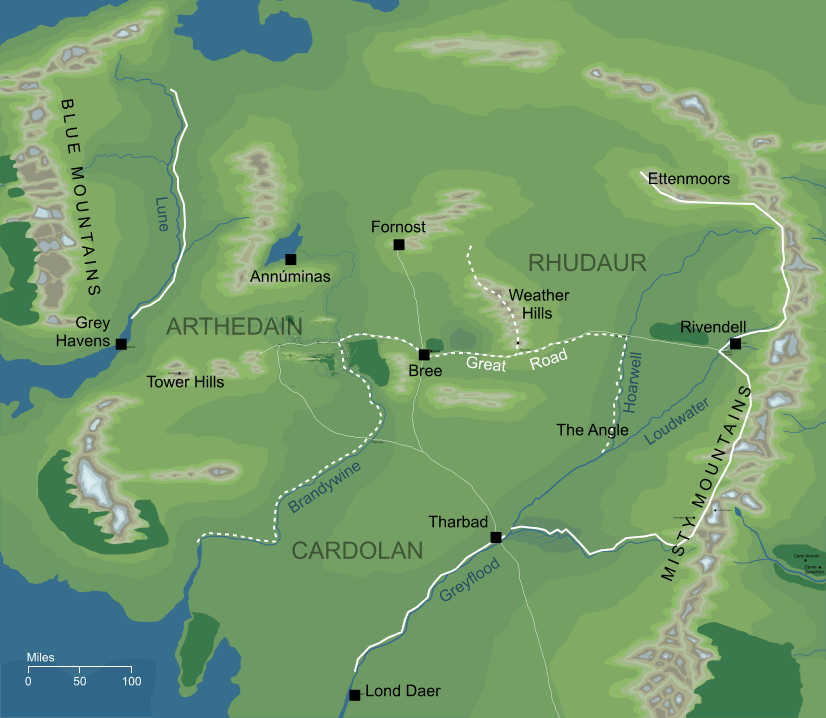
Back when I used Tumblr, in 2014 or whereabouts, I wrote the below about the idea for a the Lord of the Rings television series in the vein of the then recent Game of Thrones, set during the Third Age and sticking close to Tolkien's established history, focused on the last Kings of Arnor and Gondor. It would have been closer to the time of the Lord of the Rings, focused on more familiar peoples and places, and features characters we were familiar with. I had hoped that Amazon's the Rings of Power, when it was announced, would be something like my vision. It was not. It was fine. I actually havent finished it (though I have a worse attention span than I did when I was at Uni, so maybe I would have enjopyed it more then. But it wasn't close to my idea in any regard. It ignores the established history, and takes certain shortcuts that I dont see as necessary. I thought I'd edit the below, update it, and perhaps expand in future..
In the North after the war and the slaughter of the Gladden Fields the men of Westernesse were diminished, and their city of Annuminas beside Lake Evendim fell into ruin; and the heirs of Valandil removed and dwelt at Fornost on the high North Downs, and that now too is desolate. Men call it Deadmen's Dike, and they fear to tread there. For the folk of Arnor dwindled, and their foes devoured them, leaving only green mounds in the grassy hills.
What was Arnor like? Its aristocracy and government, the culture and the language of it's people. The above quote shows that Elrond, a contemporary of Arnor's entire history, never regarded it as attaining the heights that Gondor did. This, and the relationship the Bree and Shire-folk had with the Kings of Arnor have had me thinking; what was Arnor like?
Gondor's national project was to recreate Numenor of old, Arnor's was simply to survive. Arnor's Numenorian nobility, rather than being lords of the people as the Gondorions did, acted like the elf kingdoms of Lindon and Hollin did when they were dominant. While they did rule the land, they rarely pressed their rule onto the native Edain (Breefolk etc). Whenever possible, they stayed within their settlements like Annuminas. This also explains why the line of Isildur, from Valandil to Aragorn, stayed so 'purely' Numenorian.
The Dunedain of Arnor's relationship with the 'lesser' Edain was that of protection, like the relationship medieval Knights would have with the peasantry of the land, before they became their lords rather than their protectors. This sense of need of protection carried down after the war with Angmar and informed the Rangers of the Dunedain of their role in the north. Maybe initially there was a Numenorian 'Earl' or 'Lord' of Bree (for example), who would act in the King's name, only intervening when the civic authority (the Mayor) proved to be incompetent; similarly to the King of Dale's relationship to the Master of Esgaroth.
After the partition of Arnor into Arthedain, Cardolan and Rhudaur, it came to resemble pre-Norman England (in keeping with Tolkien's intentions for allusion of the Shire, and Middle-Earth as a whole as an English mythology). So the status quo of the time was several kings and high lords in competition for superiority, with the rise of Angmar in the east as a common threat.

The reason I'm developing this head canon was originally because I thought a TV show about Arnor and Gondor during the fall of Arnor and the wars with Angmar could actually be fairly interesting, with political machinations between the three kingdoms of Arnor, and Gondor trying to influence politics in the North, as the Elves of Imladris try to mediate. And who would their mediator be? Perhaps a (relatively) recently arrived wise being, whose name literally means grey wanderer? Yeah, I'm suggesting that this show idea/head canon would feature a (relatively) young Gandalf, still only called Mithrandir by the elves. Maybe it could explain his name, as the Arnorians would likely associate him with the elves calling him the Wand-Elf or Grand-Elf (to Gandalf). He's trying to unite the children of Numenor against Angmar, and perhaps in his failure to save the Kingdom of Arnor, he first learns his lesson that in war alone the Shadow of the East could not be defeated. The first of his great works, to contrast against his last (the War of the Ring). I have more ideas, but they aren't solidified.